Every Torah Has Its Time

Jonathan Pollard dedicates the sefer Torah pledged in prison
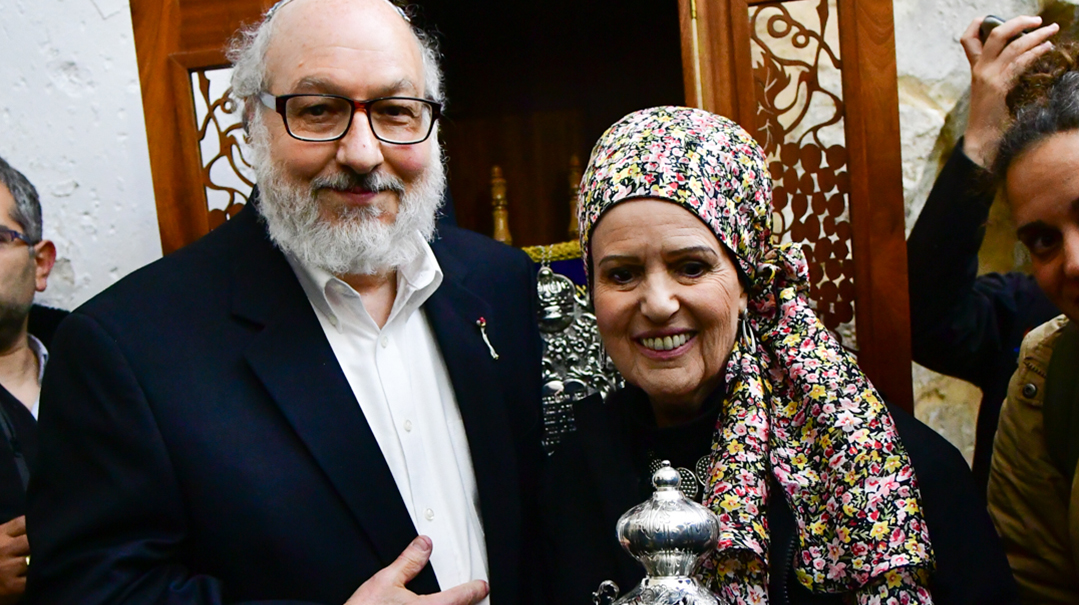
Photos: Nitzi Ilan, Shomron Regional Council
It’s been a little more than 100 days since Jonathan Pollard realized his lifelong dream of “coming home” to the Land of Israel. It seemed unimaginable during the darkness of the 30 years he spent in prison on spying charges and the next five years confined on parole.
One of the dreams he and his wife Esther shared during those years was a goal they set of writing a sefer Torah and dedicating it to Kever Yosef. Just as Yosef Hatzaddik’s dreams came true, so did theirs.
Mishpacha’s editor at large Binyamin Rose was one of the invited guests, and he reveals, for the first time, the personal connection he established and has cultivated with Jonathan Pollard over the past five years
Kever Yosef, in the heart of Shechem, is situated in “Area A” under full Palestinian control. It’s open to Jewish visitors just 16 days a year.
The night last week when Jonathan and Esther Pollard donated a sefer Torah — written while Jonathan was in prison — to the burial place of Yosef Hatzaddik was not one of those 16, which necessitated getting special permission from security authorities.
The hachnassas sefer Torah coincided with the start of Ramadan, the month when devout Muslims fast all day, adding a crackling tension to the air.
The 45-mile ride from Jerusalem to Shechem in a bulletproof bus was arduous, lasting two and a half hours, twice as long as usual. Arab vehicles aggressively cut off cars with Israeli license plates at the Tapuach Junction south of Shechem, bogging us down in standstill traffic. Visibility was reduced through the bus’s specially protected windows, but as we passed through Arab villages, we could see the streets were bustling. Stores were packed with shoppers stocking up for break-the-fast meals, and animal carcasses hung from hooks outside butcher shops to tempt the meat eaters.
Our group of about 50 people and the Pollards were treated to a lavish dairy buffet at the Kabir Winery on the pastoral yishuv of Elon Moreh, population 2,000. The Torah, in parshas Lech Lecha, relates that Elon Moreh was one of Avraham Avinu’s first stops when he entered the Land, when the “Canaanites were still in the Land.” Not much has changed in 4,000 years, as Jews are still in the minority in this part of the Shomron.
Jonathan and Esther Pollard traveled there privately. The crowd was intimate; nevertheless, the Pollards looked a bit awed when they arrived at the gathering.
Once they settled down, I ambled over to the head table and tapped Jonathan on the arm. He greeted me, “Binyamin!” and I made the brachah of mechayeh meisim.
I made a l’chayim, and Jonathan looked at me and said: “We got here.”
I replied: “I always knew you would.”
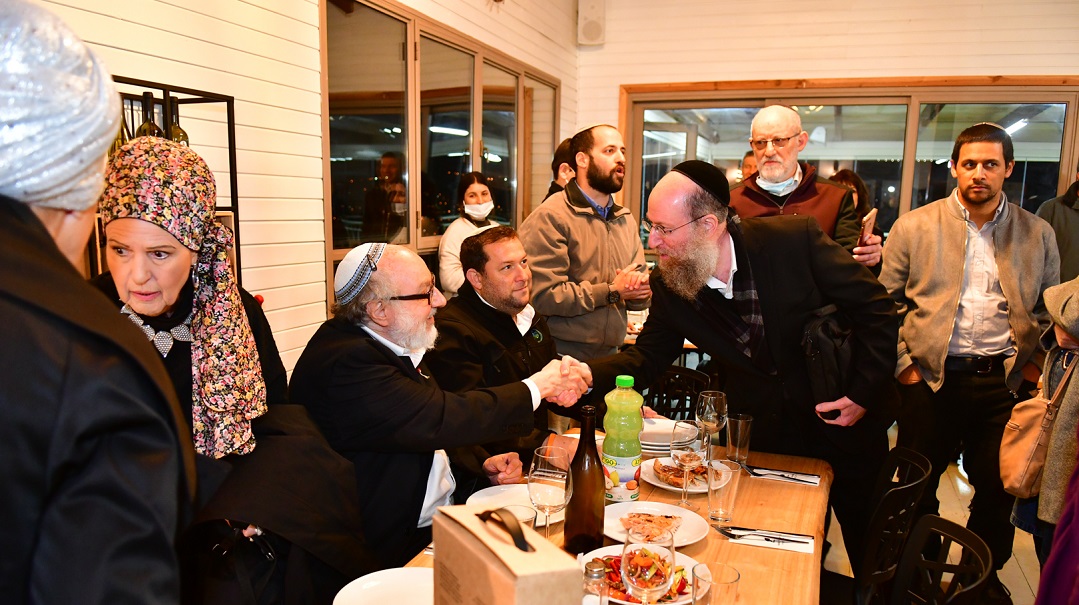
Warm and Witty
The mechayeh meisim brachah, normally said upon seeing a good friend for the first time after a year has passed, was appropriate, and here, for the first time, I’m making a full disclosure: Jonathan Pollard and I became good friends following a visit I paid to him in his cramped studio apartment on Manhattan’s Upper East Side in 2016, when I was on assignment in the US. This was about six months after Pollard’s release from federal prison on parole, after having served 30 years of a life sentence for spying for Israel — a friendly country — an offense that normally would have warranted perhaps a seven- to nine-year term.
Pollard’s close friend and confidant, Rabbi Pesach Lerner, arranged my visit. Since the terms of his parole prohibited him from giving interviews, the ground rules were that I was visiting as a friend, not a journalist, and everything was off the record. Any indiscretion might have been grounds to reimpose a prison term, chas v’shalom, or lead to harsher parole conditions.
I had no idea what to expect. Here I was, visiting one of the most famous “spies” in the world, whose case reverberated for decades in Washington and Jerusalem, and served as a topic of negotiations between several US presidents and Israeli prime ministers. I knocked on his door, and all the complexities I read about became very simple. Jonathan opened the door and hugged me, as if we were long-lost friends. He wore a blue plaid shirt and jeans and a large knitted kippah.
My eyes soon strayed to the big black wristband on his arm, which was part of the GPS tracking device that allowed parole officers to keep tabs on his whereabouts. My wrist often chafes from my wristwatch, especially on hot days. I can’t imagine the anguish of wearing a piece of equipment like that day and night for five years, even in the shower, or the gratification he must have felt when his parole ended last November and he could finally cut it off.
I found Jonathan Pollard to be a dedicated Jew. Personality-wise, he was warm, witty, well-read, and a great conversationalist. His intelligence was off the charts. I could see why he was suited to be a Navy analyst.
The Pollards’ studio apartment couldn’t have been more than 300 square feet. It was packed with books from floor to ceiling. I stayed for three hours and kept our conversation focused on the present and the future, not the past. We shared our viewpoints on current events and politics.
I would have stayed much longer, but my next appointment was beckoning. We agreed to stay in contact, and we did over the years, on a regular basis. I usually let Jonathan take the initiative, and I kept our relationship strictly confidential until he gave me the go-ahead last week to go public, although the content of that correspondence will remain personal and confidential, like any communication between good friends.
I will say, though, that I often checked our correspondence for any embedded messages, especially hints about his impending release. I never found any. Jonathan played by the rules and even up to the very end, he didn’t know that his parole was coming to an end in mid-November and that he would finally be a free man — free to come home.
There were two things that struck me about Jonathan. Any time he spoke about his longstanding dream to live in Israel, he never used the word “aliyah.” He always said “coming home.” He had never lived in Israel, and had only visited here in his youth, but to him, Israel was home.
The second was a story he told about one of the occasions when he would stroll along the banks of the East River, near his neighborhood. Having gotten accustomed to threats on his life and well-being in prison, he expressed his fear to me that someone who found his continued existence to be “inconvenient” would be stalking him, see him on the riverbank and shove him into the water, just like that.
That story always haunted me, and I prayed it would never happen.
So the brachah of mechayeh meisim was quite fitting. Since he “came home” on the private plane of Sheldon Adelson a”h at the end of December, I hadn’t seen him until last week. He and Esther are very private people, and Jonathan has been devoting much of his time to being Esther’s caretaker, as she continues her battle to regain her full health from a potentially life-threatening disease.
Esther spoke publicly at the buffet dinner, which preceded the hachnassas sefer Torah, summarizing how the events that led up to this night unfolded. Jonathan spoke later, at Kever Yosef. A few nights later, I talked with both Esther and Jonathan to flesh out more detail, and their quotes below are from our conversation.
Paying on Time
“For many years, Jonathan and I dreamed of writing a sefer Torah,” Esther began, saying it was a frequent topic of discussion when she visited her husband in prison. “But we had no way of doing it because we had absolutely no money and no support. I was managing all of our expenses on my salary as a teacher. For a long time, it remained a dream, but we vowed to each other that this was something we would do.”
Twelve years ago, when Esther was in Israel advocating for Jonathan’s release, she met with one of their long-time supporters — Israel’s former Sephardic chief rabbi Rav Mordechai Eliyahu ztz”l. Rav Eliyahu made it his business to visit Jonathan in prison whenever he traveled to the US, and the Pollards considered him to be their rav.
“It was close to Chanukah,” Esther continued. “We were so longing for Jonathan to be home for Chanukah, so I told the rav I wanted to buy a chanukiyah for Jonathan as a segulah in Heaven to draw him home to light Chanukah candles here.”
Rav Eliyahu was thrilled, but he said for it to work as a segulah, it had to be pure silver.
“I groaned immediately,” Esther said. “Where would I get the money for a sterling silver chanukiyah, especially at this stage of the game, when we were so strapped financially?”
For Esther, a credit card was a foreign object. “I never bought anything on credit. We were brought up that if you had the money to buy something, you bought it with cash, and if you didn’t, you didn’t buy it.”
She took the plunge. Once the chanukiyah was paid off, she called Jonathan one day with excitement.
“If we can pay off the chanukiyah on tashlumim [payments], why not pay off a sefer Torah the same way?” she asked. “Jonathan was very cautious. He was worried about me putting so much pressure on myself, but in principle, he was as thrilled as I was with the idea.”
Esther contacted Rabbi Moshe Flumenbaum, proprietor of the well-known HaSofer concern on Strauss Street in Jerusalem’s city center, to help plan the complicated process of how a penniless man, imprisoned in America, could have a sefer Torah written for him in Israel. Rabbi Flumenbaum turned to English-speaking sofer Rabbi Asher “Ushie” Peterman, who agreed to work with the Pollards on their financial terms. However, the sofrim indicated that for the sefer Torah to be considered theirs, halachically, they were prohibited from accepting any contributions from others.
During the year the sefer Torah was written, Jonathan would often have to converse with his sofer, which isn’t easy when you’re in a federal prison on spying charges and the jailers are eavesdropping on every word.
“The only way Jonathan could speak to anyone in prison was by taking a very great chance,” Esther said. “So when he would call me, I would hint to him that someone else wanted to speak to him. Jonathan would look around at what was going on in his environment at the moment and figure out if he could do it. If he said yes, then I would hand the phone to someone else. He was also able to sign what we needed. I won’t tell you how. We did it under great duress and were risking a lot, but we were very determined.”
For the last 11 years, the sefer Torah sat in the sofer’s safe. “We hoped and prayed it would be the segulah that would bring about his release, but it didn’t happen,” Esther said.
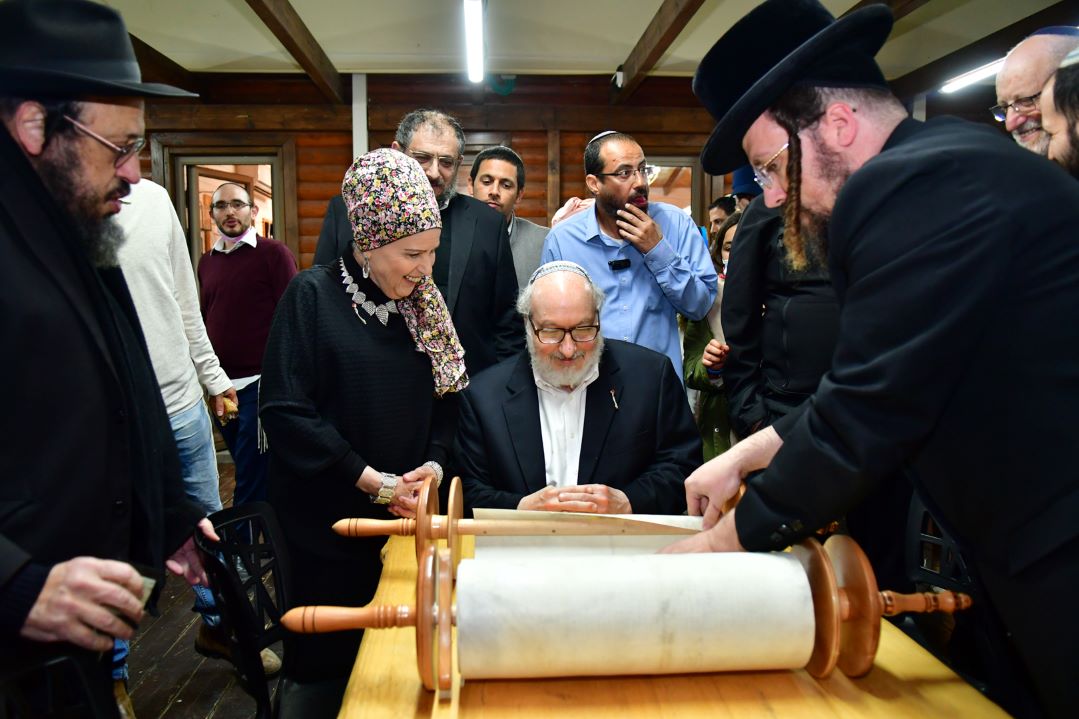
During this period, there were too few people who judged the Pollards favorably.
“Nobody ever believed Jonathan would ever get out,” Esther said. “People would mock me and say, ‘You’re just throwing your life away. You think he’s ever going to come home? Think again.’ I got that a lot. In the media, those who were trying to shut me up and get me away from Jonathan, for their own reason, wrote that Jonathan was an ‘ambition’ on my part and I just wanted my own prisoner of Zion.”
But the Pollards fortified themselves with emunah, finding strength in each other.
“Jonathan and I never had any doubt he would come home, because we know G-d runs the world and nobody else,” she said. “People thought it was ridiculous, but we always knew it would happen. We just didn’t know when or how it would happen.”
Once, they almost gave up.
“There was a point in time when Rabbi Flumenbaum suggested that instead of having this poor sefer Torah sitting in his safe, we could agree to place it somewhere without anyone knowing whose sefer Torah it was. We would just put a plain mantel on it and it would be put into use, gaining mitzvos, and the zechus would go to Jonathan.
“Both Jonathan and I were adamant that would not occur. We asked Rabbi Flumenbaum: ‘Isn’t it true that every sefer Torah has a soul of its own? It’s a living being and not just parchment and ink?’ He said yes. So I said, ‘If every sefer Torah has a soul, then this sefer Torah knows who caused it to be written. Don’t you think this sefer Torah is crying out too? Just like this sefer Torah is a captive child, Jonathan is a captive too and needs to be redeemed.’ ”
So the sefer Torah sat for a few more years in a safe, while the Pollards awaited the day they could dedicate it to Kever Yosef, whose sifrei Torah were destroyed some 20 years ago by marauding Arab terrorists who desecrated the tomb.
Identifying with Yosef Hatzaddik
After a dozen years, the night they had been waiting for finally arrived.
Our contingent, who came to rejoice with the Pollards, left the Kabir Winery after dinner and traveled to an IDF logistical base just outside Shechem, where about 50 of us crammed into a heavily armored bus for the short ride to Kever Yosef. It was close to midnight and the IDF had set a strict 2 a.m. deadline for our exit from Shechem.
A convoy of 20 armored jeeps and vehicles and close to 200 soldiers served as our bodyguards. On the 16 days when Kever Yosef is open by agreement with the Palestinian Authority under the Oslo Accords, some 2,000 to 5,000 Jews might visit on dozens of buses. Tonight, our solitary bus had to “sneak in.”
The ride there was quiet and uneventful. When we arrived at the black metal gate at the kever’s entrance, we were instructed to stay inside the bus until a bomb squad combed the site searching for hidden explosives. We were also told not to wander outside the compound at any time during the event. Word of our visit was kept top secret, but an IDF convoy, even of that relatively small size, will attract attention.
A small clean-up crew consisting of young religious men jumped out first, taking advantage of this rare visit to perform maintenance chores, pulling weeds out of the ground and the walls, and doing some repairs to the stones and the tziyun itself.
Finally it was our turn to disembark. We davened Maariv in the courtyard in front of the tziyun and then counted the 16th day of the Omer, Gevurah she’b’Tiferes. Yosef’s sefirah is Yesod, but considering the locale, a dose of gevurah was certainly needed.
After Maariv, we went into a side room that formerly housed the beis medrash of a yeshivah on the site, to finish the last letters of the sefer Torah that had been crying for its sponsor for a dozen years. Rabbi Shmuel Eliyahu, chief rabbi of Tzfas (and son of Rav Mordechai Eliyahu) was honored with one of the letters. So was Rav Elyakim Levanon, chief rabbi of the Shomron, and Yossi Dagan, head of the Shomron regional council. Jonathan honored me with the opportunity to write a letter as well.
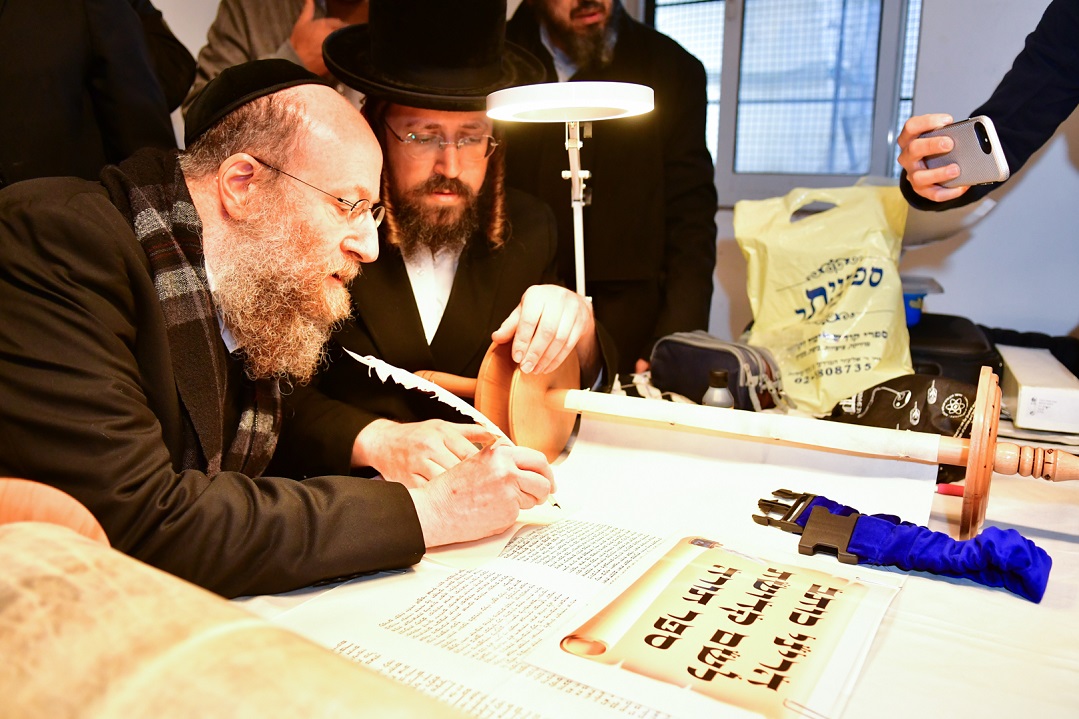
Another man honored with a letter was Rabbi Yehuda Ben-Yishai. Just last month, he commemorated the tenth yahrtzeit of his daughter, Ruti Fogel Hy”d, one of five family members murdered by Arab terrorists on a Friday night in the nearby yishuv of Itamar. Earlier in the evening, Rabbi Ben-Yishai told me that when they were sitting shivah, Esther Pollard paid them a shivah call. She brought toys for the surviving Fogel children.
“She let me know that these toys were Jonathan’s idea and that it came from both of them,” Rabbi Ben-Yishai said.
Jonathan also invited three IDF officers to write a letter, including the base commander
“One of them was religious, two were not,” Jonathan said. “I sat the brigade commander down and he looked kind of embarrassed, but he put his hand on the sofer’s hand and I noticed his hand was shaking. I looked around and some of the female soldiers had tears in their eyes.”
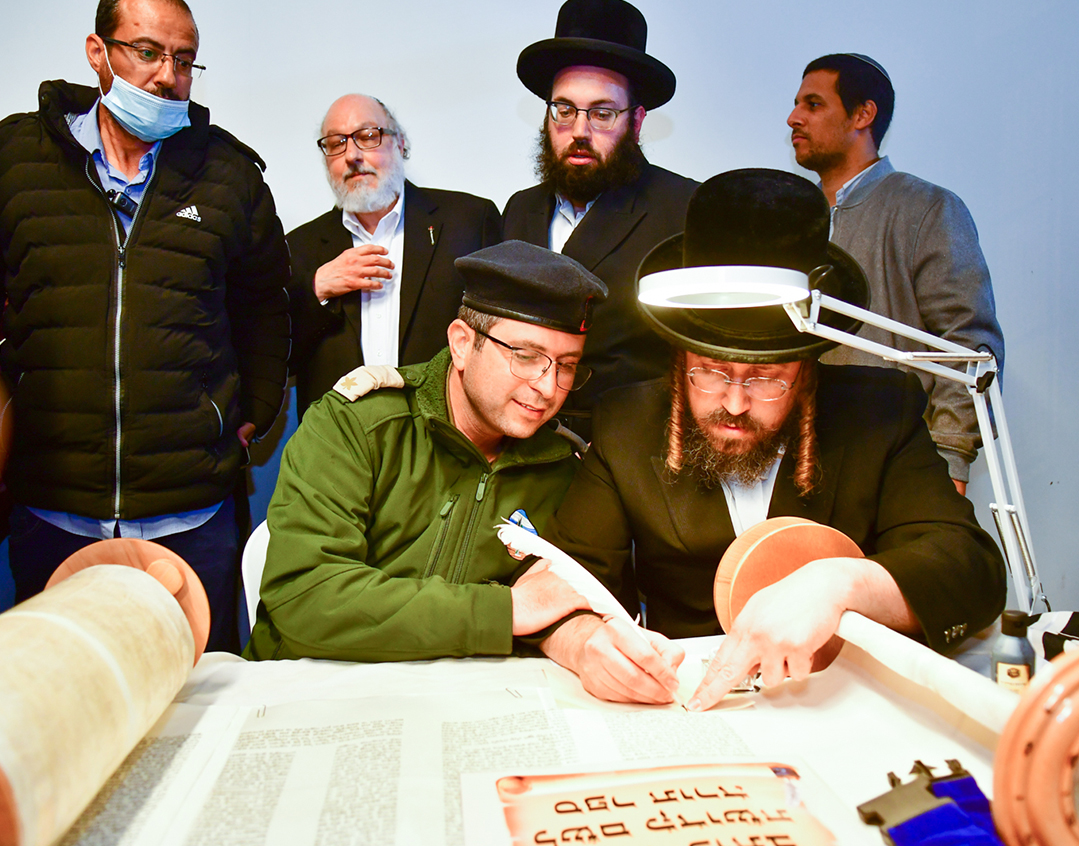
During Maariv, Jonathan said he noticed one of the IDF officers in heartfelt prayer, davening by heart. “I know he came from a far-left kibbutz, but he took a kippah out of his pocket and put it on his head and davened Arvit by heart. When I saw that, I said to myself, ‘We’re going to win.’ It’s all about achdut. I saw it there.
“We have such good people here,” Jonathan added. “We are a country rich in wonderful people. These were perfect examples of what we are, and the world just twists our image into something so evil you can hardly recognize it.”
He explained the strong soul connection he feels with Yosef Hatzaddik.
“I feel very close to Yosef Hatzaddik for two specific reasons,” Jonathan began. “He was betrayed by his brothers and sold into slavery. I understood what that was like, because that’s what happened to me. The second thing is Yosef was also falsely accused of a heinous crime he never committed — treason against his master. That resonated with me because I too had been accused of a heinous crime that I never committed.”
Jonathan made mention of three martyrs, murdered at the site since the Oslo Accords: Madhat Yousef, a Druze border guard, killed by a terrorist while on duty at Kever Yosef some 20 years ago; Rabbi Hillel Lieberman, who was shot and killed a few weeks later while trying to salvage the sifrei Torah at Kever Yosef; and Ben Yosef Livnat — nephew of former Likud MK Limor Livnat — killed by Palestinian police in April 2016.
“Their blood is still crying out for vengeance,” Jonathan said.
Noting that Yosef had instructed his children to carry his bones from Egypt before they left, although he never specified a burial site in Israel, Jonathan related that to his own homecoming.
“The significance lay in the fact that Yosef didn’t care where he was buried because the whole land of Canaan was kodesh, and all of it was governed by Hashem. By Yosef, the Torah doesn’t say that his burial reunited him with his ancestors as it said with his father, Yaakov. Yosef was less concerned about being reunited with his ancestors and more concerned that our people should remember their G-d-given connection to the land, and that they and their descendants were the only legitimate owners of the land.”
Jonathan reiterated that point when we spoke later in the week. “Even if we can’t reclaim all of the land physically right now, we must do everything we can to spiritually reclaim the land. By bringing our sefer Torah here, our kavanah is to emotionally and spiritually reclaim the land.”
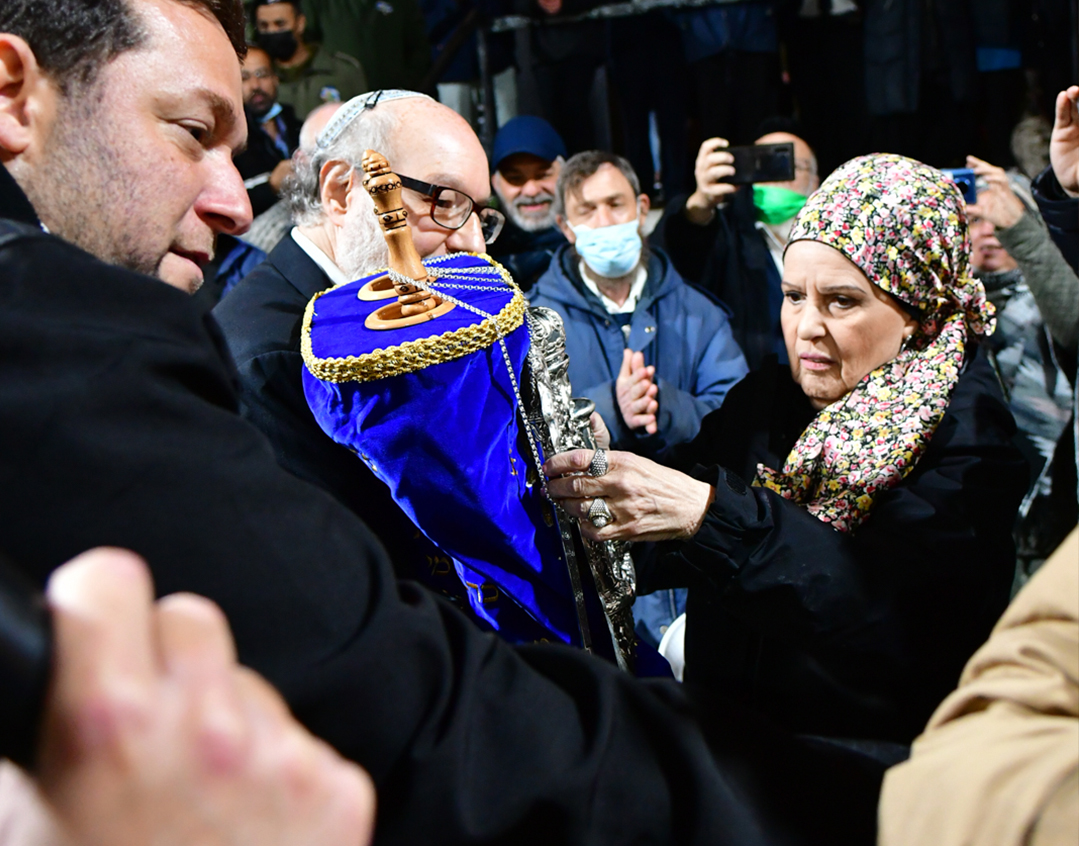
Follow the Path of Redemption
Considering the late hour, and the fact that we are in the middle of the mourning period of Sefirah, we confined ourselves to a short dance with the newly dedicated sefer Torah inside the small room that contains the tziyun.
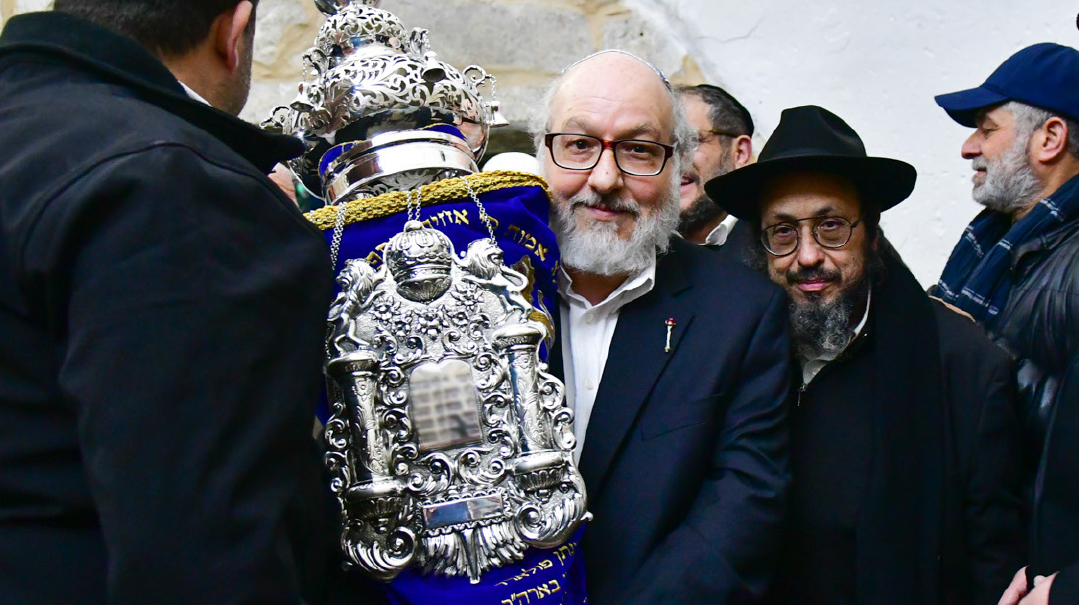
Our 2 a.m. deadline had arrived. We scrambled back into the bus. The IDF convoy lined up again and we started to roll. This time, we didn’t get far before we heard sounds of gunfire or explosives.
One young man on our bus said “shelanu,” meaning it was our forces firing. I wasn’t so certain.
I knew for sure it wasn’t only shelanu when a huge rock landed with a sickening thud on the window of my seat. The barrage of rocks made a hairline fracture in one of the windows, and suddenly, I could smell tear gas seeping in and my eyes began to burn.
Here’s where the coronavirus masks we’ve been wearing for the past year came in handy. “If you’ve got a mask, put it on now,” yelled one of the passengers.
The Pollards were riding back to the army base in a separate armored vehicle.
“We were attacked too,” Jonathan said. “I thought we were getting shot at. There were concussion grenades and tear gas. The rocks were thrown at us with such ferocity and murderous anger. I said to myself, ‘These are our peace partners?’
The army opened up with every non-lethal weapon they had to clear the route, but even with an armored vehicle, there is always a possibility that a round will come through, Jonathan said. “I looked at one of the Israeli soldiers and asked, ‘Is this armor able to stop a Kalashnikov 762 round?’ He just nodded his head yes.”
His next question was why he should even have to ask that question after such a moving ceremony.
“We got back home at five o’clock in the morning,” Jonathan said. “I couldn’t sleep because I was overwhelmed with the realization of what had occurred.”
He comforted himself by noting what he called our “typical Jewish response” to the attack.
“We don’t respond with hatred and violence and antipathy,” Pollard said. “We follow the path to redemption by praying that G-d will give us success and we will be able to reclaim the land entirely.”
The next night, on the eve of Yom Hazikaron — Israel’s memorial day for fallen soldiers — the Pollards found themselves at a Jerusalem restaurant that was holding an event for “lone soldiers,” defined as IDF men and women without immediate family in Israel.
When the organizers recognized him, they asked him to speak.
“We were so tired and exhausted,” Jonathan said. “But Esther said, ‘You have no choice. You have to do it.’ ”
On a screen at the restaurant were pictures of lone soldiers who had fallen in battle, or to terrorist attacks.
“Talk about having your heart and guts ripped out,” Jonathan said. “One brother and sister of an American lone soldier who was murdered were there and they could hardly get through Kaddish. I got up and said these soldiers aren’t gone, they’re still with us. I told the event organizer at the end of the evening, that I pray to G-d Almighty that when we have this ceremony next year, there won’t be any new pictures on the screen.”
As an encore, the next night, on Yom Ha’atzmaut, Israel’s independence day, the Pollards attended another event at a restaurant, which he called the secular counterpart to what took place at Kever Yosef.
One of the diners approached Pollard and apologized for the fact that the State of Israel hadn’t done anything for him, at least publicly, for the torment he went through for 35 years.
“I looked at her and said, ‘I’m thankful that you people never forgot. Because what I did, I did for you. Not for a faction, or a politician, or for a political party. I did it for the people of the Land of Israel,’ ” Pollard said. “And what you’re doing for me tonight is a show of achdut; that’s what Hashem looks for in us. We can’t be beaten when we exhibit this kind of unity.”
(Originally featured in Mishpacha, Issue 857)
Oops! We could not locate your form.












